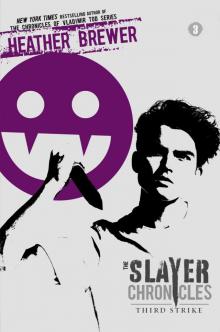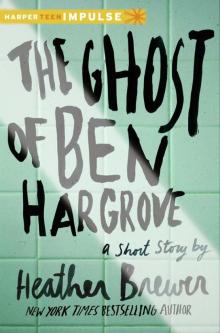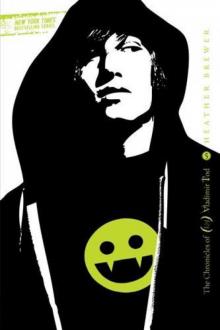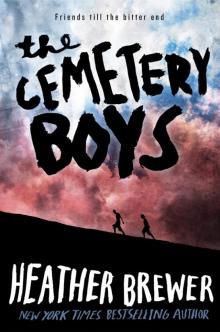- Home
- Heather Brewer
The Ghost of Ben Hargrove
The Ghost of Ben Hargrove Read online
Contents
Begin Reading
Afterword
Excerpt from The Cemetery Boys
Prologue
Chapter 1
Chapter 2
Back Ad
About the Author
Copyright
About the Publisher
Begin Reading
My dreams are false lullabies. They are lies that I tell myself when I am asleep to get me through the nightmarish truth that faces me when I am awake. Sometimes, when I wake up, I make a conscious choice to keep my eyes closed, to pretend that I’m still sleeping, so that I won’t have to face what awaits me in the day.
Or the night.
To be honest, I can’t be certain which is which anymore. The room that I’m kept in has no windows, and I don’t know what lies beyond the door that never opens. Maybe only darkness.
At first, when I wake up, I don’t recall my name, but then it comes to me in whispers, floating over me until it lands like cobwebs in my mind. Ben. My name is Ben. My age soon follows—seventeen—and then come the scattershot memories of my life before this cell. Mostly, my mind is a blank. A gray, horrible, empty cube—much like the cell that I always wake up in.
I’m never awake for long before I hear them moving down the hall. Whoever is keeping me here must have cameras hooked up in my room, as they seem to know precisely when I wake, move, blink. . . . They never move unless I do. When I go still, the footsteps stop.
I know they’re out there, but I haven’t found them yet. Maybe they’re just listening. Through the thin walls, via hidden microphones that I also haven’t located. Or maybe my exhausted, frightened mind echoes that loudly in the chamber of my skull—maybe they just know. Maybe they can sense that I’ve woken, that I’m moving, that I’m thinking about how I came to this place and how I can escape. That I’m thinking . . . and maybe what I’m thinking.
Maybe they know it all.
Maybe I am trapped here forever.
I push that thought away—back into my nightmares, back into the place in my soul that’s convinced there is no hope of ever escaping my captors—and open my eyes. A new day has begun, or perhaps just a new time. “Day” and “night” are meaningless words within the walls of my prisonlike cell. I know only the cycle from one sleep to the next.
The room I am kept in is small, roughly eight feet by eight feet. Its walls are grim and gray, stained with time and the memory of former prisoners. I use that word—prisoner—with doubt, for where I am doesn’t feel like a prison. There are no bars or guards—at least, none that I’ve seen—and my only daily visitor is of the medical persuasion. But this place cannot be a hospital, either—it’s too filthy, too frightening, to help or heal.
The walls look as if some sort of liquid once ran down them, especially in the corners, only to dry into elongated shapes that remind me of Halloween ghosts. Long, shapeless. Harmless, really, so long as no one pulls back the sheet.
My room has only a single door. It was once painted white. I can see flecks of that color here and there through what now covers it. Brief glimpses of its former identity peeking through tiny chipped holes. But the door is gray now. No more bright, clean white. Now dirty. Now gray. Now ruined with age.
The door has a small slot in its very center. Seven times per cycle, a hand appears through the slot with food—a male hand, much older than my own. On the knuckle of the pointer finger, there is a small freckle. Otherwise, the hand is flawless.
Sometimes it presents me with pills that I refuse to take. White pills. Flawless, like the door was once. Like the hand is now, apart from that freckle. The owner of the hand never speaks, never says as much as a single word. No “good morning.” No “good evening.” Just gives me my food and shuffles away, leaving me alone once again.
(I’m convinced that’s the worst part of being here, by the way. The loneliness. The emptiness. The mind-numbing solitude.)
I can remember them sometimes, my first days in this cell. Not the specifics—there are no specifics. Before the cell is hazier still. I can only hope that that time will come back to me, and soon.
When I first awoke in this room—and that was it for me, no screaming or dragging, I simply appeared here in a blink—I do remember that I tried finding a way out. I climbed onto my bed and examined the ceiling. I beat against the door with my fists. Finally, I stopped, hating the pain that shot up my arms with every blow and the bruises that had appeared on my skin. After what seemed like an eternity, I cried. I prided myself on that at the time, that it took me so long. My father would have been proud too. He’d always been a stern man, after all—a fact I could suddenly remember, as if the crying had unlocked it. Never quick with the hugs, and only ever offering the occasional high five or slap on the back as a show of affection.
He wouldn’t have cried.
He would have found a way out.
Of course, now, after what must be months of my imprisonment, I let the tears flow until there is nothing left, the well run dry. Knowing I will cry again, and soon. Crying, I’ve come to realize, is not a sign of weakness. It is a way of unlocking. I am a seventeen-year-old man who’s been ripped from his life and trapped in a room without explanation. Without reason. Without apology. Crying is one of the few things I have left.
“Because they’re a bad influence, that’s why. When’s the last time you took out the garbage or cleaned your damn room? And you think you deserve to go to a party?”
My dad didn’t bother hushing his voice so that Aaron, Tate, and Samantha wouldn’t hear. It was like he wanted them to witness his disapproval. Like maybe that would make them leave without comment, without confrontation. Like maybe if he said things about them rather than to them, it would be easier to get rid of my friends.
I clenched my jaw, keeping my voice low. He was embarrassing me. “You don’t get to control every bit of my life. I’m going.”
“Like hell you are.” My dad stood between me and the front door. Without a word, Aaron and Tate slipped outside behind him. Samantha soon followed, but not before giving me a look that said going with them would be worth this argument.
“You can’t stop me.” Mom approached Dad and put a gentle hand on his shoulder, as if to calm him. I moved my gaze between them. “Neither one of you can.”
What was the big deal? So I wanted to go to a bonfire party at the lake. It’s not like I was dealing drugs or running with a killer gang. It was a party—much like the parties that I was sure my parents had probably attended as teens. No big deal, just a little fun. They acted like I was on the verge of becoming a serial killer or something.
“We can stop you from getting your license.” Mom’s tone was gentle but threatening. At least I knew whose side she was on.
“That’s bullcrap.” Outside the front window, I could see Tate sliding into the driver’s seat of his hail-dimpled Pontiac Grand Am. Aaron opened the passenger door. Samantha stood on the front lawn, eyeing my house with some interest, waiting to see what I would do. “That’s total bullcrap. You can’t threaten me like that.”
Dad spoke definitively. “We’re your parents.”
I pushed past them and moved out the door. Mom followed, saying, “Ben.”
“I’m going.” I looked at her and then over her shoulder at my dad. Samantha’s eyes were on me. So were Tate’s and Aaron’s, but I cared more about hers. After a brief pause, I said, “You can do whatever you want, but I’m going to the party. With my friends. And I don’t give a crap what you think about them. Or me.”
I climbed into the backseat with Samantha and as we peeled out of the driveway, she put her hand on my knee and gave it a squeeze.
Footsteps in the hall. Maybe fifteen feet
or so away, and headed in my direction. They sound familiar, leather-heeled loafers on a tile floor, and I know that they belong to the hand that appears in my door seven times per cycle. Three times to present me with food. Three more times to collect the trays. Once to present me with pills. The Hand, as I think of him, never speaks, never argues, never judges. He simply presents me with these options, and then he disappears again. I tried speaking to the Hand on many occasions, but he refused to respond. Or perhaps he couldn’t. Is he mute? Is he deaf? Or is he just cruel, resigning me to my lonely fate inside these four walls? I have no way of knowing, and with every cycle I spend locked inside my strange cage, I grow more and more despondent.
The footsteps get louder with approach, but fall silent when their owner stops just outside my door. The slot opens and the hand appears, this time holding a rectangular dining tray divided into little compartments. Without hesitation, I move from my bed and pad to the door, shocked into alertness when my bare feet hit the cold concrete floor. I’m dressed in scrubs—dark blue, the only color in the palette of grays that surround me. I bend at the waist and try to peer through the slot, to get a look at whoever and whatever is on the other side, but I can’t see anything. Only darkness. With a sigh, I take the tray from the Hand, and say, “Thank you.”
As always, I receive no response. No verbal response, anyway. The Hand slides back through the slot and the slot closes. Once again, I am alone.
For a change of pace, I sit cross-legged on the floor beside the door and balance the tray on my knees. Normally, I sit on the bed to eat, but eating toast in bed means sleeping on crumbs, which only makes it weirder when I wake up to find myself in pristine, clean sheets. So I sit on the cold floor and look over what first meal has brought me today. In the top left corner of the tray, beside the two pieces of white toast, are two butter packets. In the top right corner is a small cardboard carton of 2 percent milk. The three compartments that make up the rest of the tray hold scrambled eggs, two pieces of crispy bacon, and a small bunch of green grapes. A sigh escapes me. Every cycle it’s the same. First meal consists of exactly what sits on my tray now. Second meal will be a bottle of water; a crisp, red apple; and a turkey sandwich with cheese, lettuce, and mustard. Third meal will be another bottle of water, a slice of roast beef, a side dish medley of potatoes and carrots, and a small plastic tub of tapioca pudding for dessert.
Roast beef and tapioca—yet I am offered no utensils to eat with. Perhaps it amuses them, my captors, to treat me like an animal in this way. Perhaps that’s all I am to them.
After third meal I will be offered more water and two pills. When I refuse the pills, which I always do, I will be refused the water. The Hand will simply take them away again without explanation. I know it’s strange, but I want to trust the Hand. And I’m dying to know what those white pills do. I just can’t bring myself to trust anyone who is affiliated with whoever—whatever—brought me here. I suppose my captors could drug my food—and maybe they do; maybe that’s what causes my memory to be so scattered—but I get the strong feeling they don’t. It’s as if they want me to choose the pills, rather than force the pills on me.
They are patient, my captors. So I must be patient, too.
I pluck a grape from the bunch and pop it into my mouth, then pause. Something is different. Nothing is ever different in this place, but now something is and it sends my heart racing.
Something white and square is lying beneath the bunch of grapes.
I try to act casual, no different, in case they really are watching. After chewing my grape and swallowing, I move on to the eggs, examining that white square with only the most meaningless of glances. It’s a piece of paper, and I can see that there are lines from where a pen has pressed into the paper from the other side. A note? Who would write me a note? Could it be the Hand reaching out to me at last?
Or someone else?
I eye the paper distrustfully. What if it’s a trick? What if the note is from my captors, and their patience with me has worn thin? I must remain calm. I can’t let them see how desperate I feel. So I finish my meal, saving the remaining grapes for last, and then I carefully cup the folded piece of paper in my hand.
Samantha’s lips were warm and soft—she was such a good kisser that I hadn’t even noticed my mom had walked into the living room until she cleared her throat and said, “Did you finish your history paper, Ben?”
“Working on it.” I flashed a smirk to Samantha, who grinned. All of her lip gloss had been worn off by our make-out session.
From the dining room, my dad grunted and muttered, “He’s working on something, but it sure as hell isn’t his paper.”
Samantha’s grin faltered, her face flushed in embarrassment. As she stood and picked up her books, I grabbed her gently by the wrist and pleaded with her. “Don’t go.”
“I have to.” She glanced in the direction of my dad, as if I needed an explanation. Then she forced a smile and brushed my cheek with a peck before heading toward the front door. “See you in school tomorrow.”
I walked her to the door and watched her get in her car. When she was gone at last, I turned back to my dad, the heat of anger crawling up my neck. “You don’t have to be so rude to her, y’know.”
“Maybe I wouldn’t be if you stopped kissing her long enough to raise your D average.” He shook his head and went back to his newspaper, but not before grumbling, “Really, Ben, when are you going to grow up?”
Footsteps in the hall again. The Hand has returned to collect my tray. The slot opens and I pass the now-empty tray through. The slot closes again without issue.
Still, I don’t want to hurry. Nothing different has happened to me in so long. I want to draw out this moment, despite the fact that I am absurdly anxious to open my hand and unfold the note. Even the anxiety feels like something to savor.
Finally, with a deep breath, I stretch out my hand, revealing the white square in my palm.
As I stare at it, I realize what I’m really scared of. What if I open it and it’s nothing? What if I read it and the note makes no sense? I desperately want to cling to the new spark of hope that the paper has given me, but hope alone isn’t going to help me escape this room. If anything is going to change, it has to start with action.
“Don’t open it.”
The words are whispers. They come into my room like a breath just over my left shoulder and send gooseflesh up my arm. The voice is familiar. It sounds like memory.
I turn my head quickly to the left, then the right, searching for the speaker. But my cell is empty. I am as alone as ever. I look at the slot in the door, wondering if someone is standing on the other side. Maybe it’s the author of the note, now having second thoughts. The room has fallen silent once again.
Cupping the note in my hand, I move to the door and press my forehead to it. I want to be close to someone. Anyone. But for the Hand, I haven’t encountered another living soul in so long. Those three whispered words are valuable to me, even precious. I want to hear them again. I want to hear so much more. My response is a whisper, filled with the hope that the speaker and only the speaker will hear me.
“Why shouldn’t I?”
The notion that I am about to engage in conversation with another person after all this solitude causes my stomach muscles to tense. In my mind are a hundred other questions. Who are you? Where am I? What is on the other side of the door? But I don’t want to scare the speaker away.
I turn my head slightly, rolling my skull against the surface of the door until my ear is pressed against it. I listen. There are no more whispers. I speak again, this time in a full, unmuted voice.
“Are you there?”
My fingers close tightly around the piece of paper. Heat rises in my neck, my cheeks, my forehead. I am angry now, but I’m uncertain why.
“Don’t open it.”
I pull back from the door, stunned. This time, the whisper is definitely coming from the open space behind me. The speaker is in my room.
/>
I turn around slowly, not knowing how someone could have gotten inside my cell without my noticing. There are no windows. Just the chipped, gray door. I search the room, and as I do, I become only more confused. The room is empty.
My lips feel suddenly dry. Licking them, I speak once again. This time, my voice shakes.
“Who said that?”
No one answers.
I stand there, staring at the room for what seems like hours. Was I hearing things? I must have been. Maybe I am finally going crazy.
Crazy or not, I still have the note.
“Don’t open it.”
A boy’s voice. This time louder. Loud enough to startle me. I drop the paper. It flutters to the concrete floor below. I whip my head around, but again, nothing, no one is there. I am still alone. I wonder if I was crazy before the cell, or if in fact the cell has caused it.
Pushing the voice out of my mind for the time being, I retrieve the note from where it fell on the concrete floor. I pull apart one fold, then the next. The paper itself has clearly been ripped from a pad of pristine white, with no header to indicate who might have sent it, no distinguishing features whatsoever. I scan my treasured find—the black, inky swoops of handwritten letters across the small piece of paper. Relief fills me. It’s not a receipt for grapes.
I take my time reading the words, just in case this is the only chance I will ever get. The note contains three lines, and I read them over several times, letting each one sink into my memory, a permanent fixture. I’m not sure I understand what’s written here.
There is no freedom.
There are no walls.
The boy is real.
The last sentence certainly gives me pause. What boy? Is the note referring to the boy whose voice I thought I heard, just moments ago? Or is there someone else? A fellow prisoner, maybe?
After reading the note a fourth time, I fold it back into a square and slide it under my mattress. As always, the sheets are crisp and clean—my captors must change them while I am sleeping, but I still haven’t figured out how. I am also clean, as are the scrubs that I wear. If I go to sleep with a food stain on my shirt, I wake up to find it clean, pristine. I have no idea how my captors are doing these things without my notice, but they are. I sit back, resting on my heels, and stare at the mattress that now covers the note. Will the note be there when I awake next cycle? Or will they collect it while I sleep? It’s a question I let stew in my brain for a good, long while, simmering there with my questions of what this place is, how I got here, and why I’m having such a difficult time remembering things.

 Third Strike
Third Strike Eleventh Grade Burns
Eleventh Grade Burns The Ghost of Ben Hargrove
The Ghost of Ben Hargrove Ninth Grade Slays
Ninth Grade Slays Twelfth Grade Kills
Twelfth Grade Kills Soulbound
Soulbound The Cemetery Boys
The Cemetery Boys Second Chance
Second Chance Tenth Grade Bleeds
Tenth Grade Bleeds The Slayer Chronicles: First Kill: First Kill
The Slayer Chronicles: First Kill: First Kill The Chronicles of Vladimir Tod: Twelfth Grade Kills
The Chronicles of Vladimir Tod: Twelfth Grade Kills